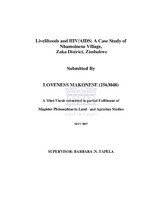| dc.contributor.advisor | Tapela, Barbara Nompumelelo | |
| dc.contributor.author | Makonese, Loveness | |
| dc.contributor.other | School of Government | |
| dc.contributor.other | Faculty of Economics and Management Sciences | |
| dc.date.accessioned | 2013-10-11T09:34:21Z | |
| dc.date.available | 2009/10/05 11:22 | |
| dc.date.available | 2009/10/05 | |
| dc.date.available | 2013-10-11T09:34:21Z | |
| dc.date.issued | 2007 | |
| dc.identifier.uri | http://hdl.handle.net/11394/2275 | |
| dc.description | Magister Philosophiae (Land and Agrarian Studies) - MPhil(LAS) | en_US |
| dc.description.abstract | The Human Immune Virus (HIV) and Acquired Immuno Deficiency Syndrome (AIDS) isa pandemic that has worsened the plight of vulnerable communities and environments in Africa. It is estimated that 40,3 million adults and children are living with HIV and AIDS and 3.1 million adults and children died in 2004 in the world. Southern Africa is the most affected region with a very high HIV/AIDS prevalence rate. The primary objective of the proposed study was to examine livelihoods and coping strategies of HIV/AIDS-affected households of Zaka District in Zimbabwe. Attention was given to institutional frameworks for HIV/AIDS interventions as district and village level. A second objective of the study is whether interventions are appropriately aligned and responsive to household livelihoods and coping | en_US |
| dc.language.iso | en | en_US |
| dc.publisher | University of the Western Cape | en_US |
| dc.subject | HIV and AIDS | en_US |
| dc.subject | ZImbabwe | en_US |
| dc.title | Livelihoods and HIV /AIDS: a case study of Nhamoinesu Village, Zaka District, Zimbabwe | en_US |
| dc.type | Thesis | en_US |
| dc.rights.holder | University of the Western Cape | en_US |
| dc.description.country | South Africa | |

